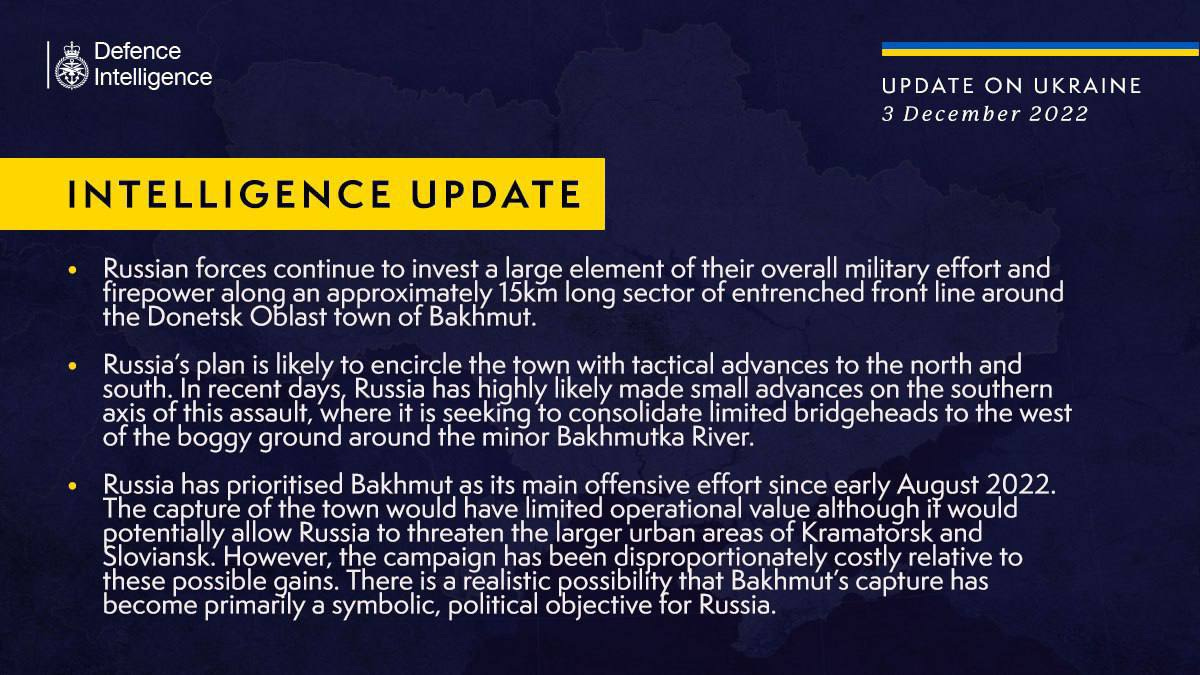Dec 3 The Saturday Edition
Day 283: Sumy Kharkiv Mariupol Dnipro 18packages 50% Iran HUN Vatican ROC Scholz MOL $60 Fridman-A&Ps- ISW UKDef Schmitt Matviichuk Tenzer Lautman Cosmopolitan Globalists ACStratcom
Catching up…
EA Worldview’s Ukraine Up-date- hop over to Scott’s amazing hourly Ukraine up-date page. I’ll fill in with some bits and bobs.


Stories we’re following…
Governor: Russia attacks border settlements in Sumy Oblast 76 times on Dec. 2. The Seredyno-Budska, Znob-Novhorodska, Krasnopilska, and Bilopilska communities of the northeastern Sumy Oblast, which borders Russia, came under fire on Dec. 2, Governor Dmytro Zhyvytsky said on Telegram.
As a result of the Russian shelling, Kharkiv suffered losses of at least 9 billion dollars. According to the mayor of Kharkiv, Ihor Terekhov, approximately 500 apartment buildings were totally destroyed. In addition, 109 schools and 110 kindergartens were destroyed or damaged to one degree or another, some of them cannot be restored. Russian troops also damaged the buildings of 53 medical institutions, boiler houses, water pumps, and city transport.
Ukrainian authorities in Kherson have urged people on the east of the Dnipro River to evacuate. Governor Yaroslav Yanushevych said that authorities would help people to evacuate during the daytime of Saturday to Monday, according to the Kyiv Independent.

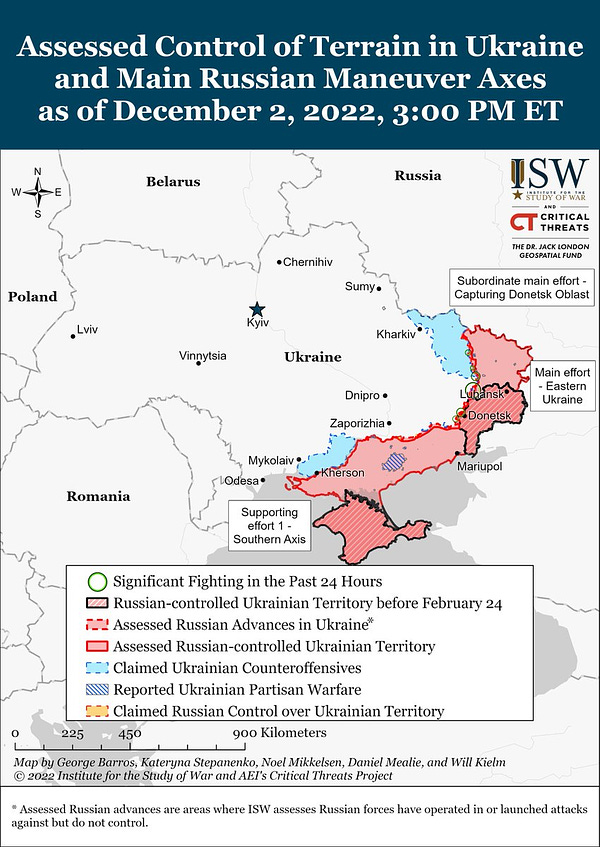
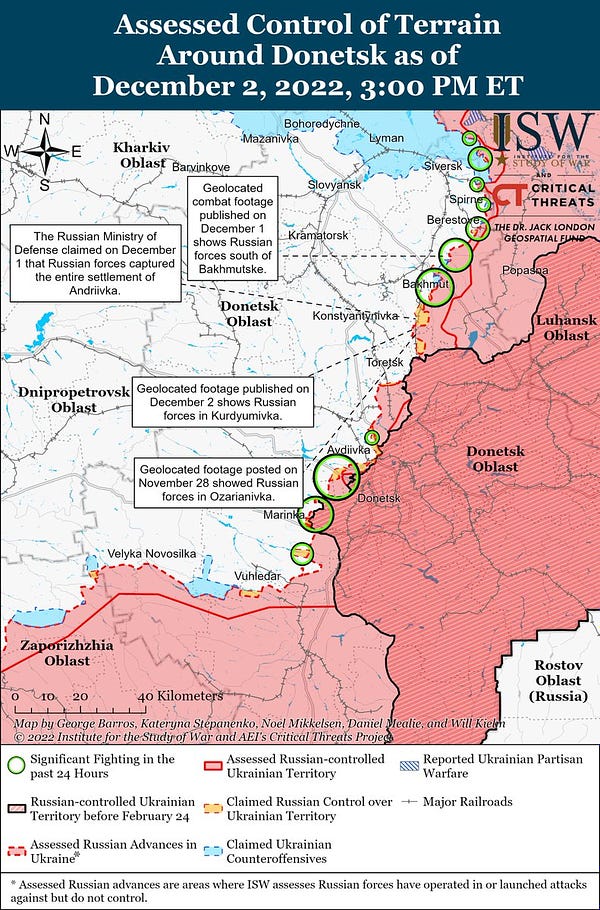
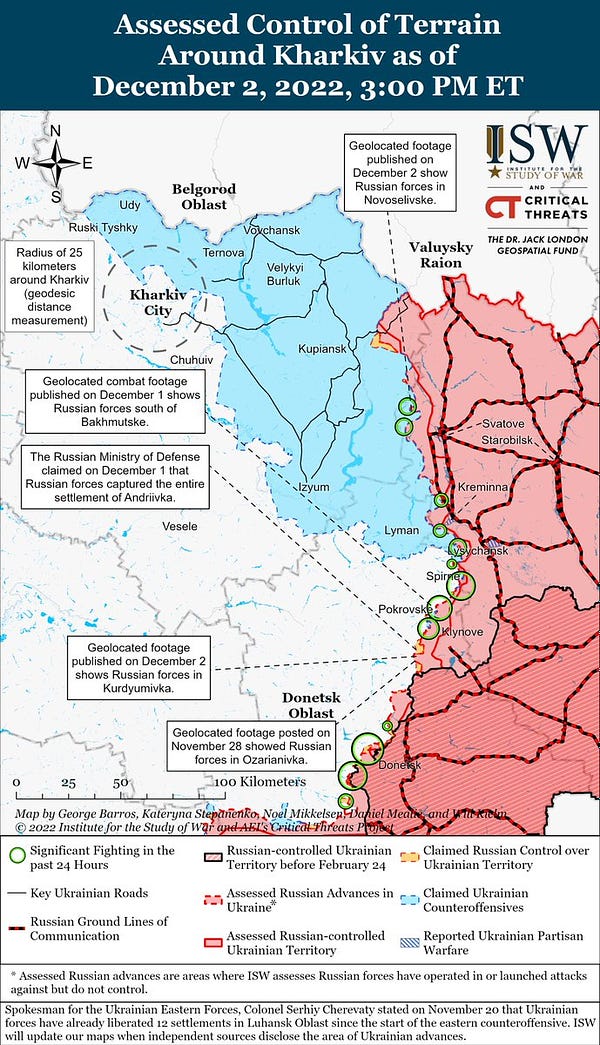
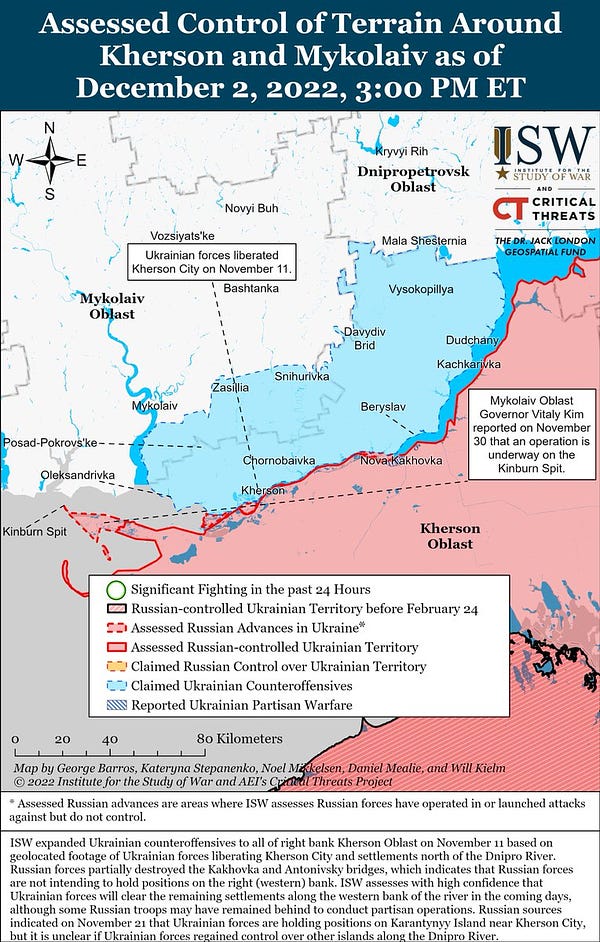
Satellite image shows main cemetery in Mariupol grown significantly. The number of graves at Mariupol's Starokrymske cemetery on the western side of the city has significantly expanded, according to new satellite imagery published by U.S. satellite imagery company Maxar.
As many as 18 Ukrainian diplomatic missions abroad have received either letter bombs or blood-stained envelopes. "This campaign is aimed at sowing fear and intimidating Ukrainian diplomats," Foreign Minister Dmytro Kuleba said in an interview with CNN.
The Russian publication Proekt has calculated that Russia’s Black Sea Fleet has lost 15 percent of its combat vessels since the start of the invasion of Ukraine.
A fire started in a building at the Mikoyanovsky meat-packing plant on Moscow’s Volgogradsky Prospekt. The cause of the fire is currently unknown.
Russian defense purchasing set to increase by 50 percent in 2023. When speaking before the Defense Ministry collegium, MoD Shoigu said that Russia’s defense purchasing will increase by almost 50 percent in 2023, “factoring in the additional budgetary means being allocated. This will enable us to supply military formations and permanent-readiness units with weapons and equipment at around 97 percent,” he said.
Iran has officially requested Russia to help it quell the popular uprising through the sales of anti-riot vehicles and equipment and dispatch of Russian advisors as it's preparing for a long-term confrontation with protesters, according to reports obtained by @IranIntl.





Ukraine's ambassador to Vatican says his house was vandalized. Ukraine's ambassador to the Vatican, Andriy Yurash, said on Dec. 2 that the entrance to his home in Rome had been smeared by unknown people with what he believed to be animal feces.
President Zelensky approves proposal to ban Moscow-backed church, sanctions bishops. President Volodymyr Zelensky signed a decree on Dec. 2 to approve a proposal by the National Security and Defense Council to ban Russian-affiliated religious groups and impose sanctions on a number of pro-Moscow bishops.
President Biden has no intentions to talk to Putin for now. U.S. President Joe Biden is not planning to speak to Russian dictator Vladimir Putin about ending the war in Ukraine war as Putin has shown no inclination for dialogue, the White House said on Dec. 2.


Ministry worsens Ukraine's GDP forecast amid Russian attacks on energy infrastructure. Ukraine's GDP is expected to drop as much as 32-33.5% due to Russian missile strikes on energy infrastructure, Economy Minister Yuliia Svyrydenko said on Dec. 2.
Google to provide $2 million for digital education of Ukrainians. The grant will be used to train Ukrainians in digital literacy, “bridging the digital divide,” and expanding the Diia Digital Education platform, Digital Transformation Minister Mykhailo Fedorov said on Dec. 2.
Moldovan deputy prime minister Andrei Spînu announced an energy deal on Saturday he said would reduce the risk of “massive electricity outages”.
EU makes final decision to cap Russian seaborne oil prices at $60 a barrel and so has Australia. Security experts from the CSIS thinktank have warned a cap at $60 is toothless since it is above the price of existing Russian oil prices of about $52 a barrel.
Russia has said it will continue to find buyers for oil, despite a price cap for seabourne oil being set at $60 a barrel. In a post on Telegram, it said: “Steps like these will inevitably result in increasing uncertainty and imposing higher costs for raw materials’ consumers. Regardless of the current flirtations with the dangerous and illegitimate instrument, we are confident that Russian oil will continue to be in demand.”
Rome greenlights weapons delivery to Kyiv in 2023. On Thursday evening, the Italian government adopted a decree-law to extend the authorisation for the transfer of military means, materials and equipment to the government authorities of Ukraine until December 31 2023. “The threat posed by Russia to the peace and the security of our continent requires from all democracies, particularly those in Europe, a renewed impulse of unity and cohesion,” said President Sergio Mattarella on Tuesday.
Russian oligarch Fridman arrested in UK on suspicion of money laundering, released on bail. The U.K.’s National Crime Agency reportedly arrested a “wealthy Russian businessman”, revealed by Ukrainian Pravda to be billionaire Mikhail Fridman, on Dec. 1 on suspicion of several offenses including money laundering.
Iran recruited a fugitive Hell's Angels boss to help organize terror attacks on synagogues, police in Germany believe. Detectives identified Ramin Yektaparast as key suspect as they investigate attacks on two synagogues last month.
Belarusian opposition creates 'free digital state.' Belarusian software developers Pavel Liber and Yaroslav Likhachevsky announced the launch of the Digital Belarus project on Dec. 2.

Russia and Ukraine are fighting the first full-scale drone war. In the battle between Russia and Ukraine, drones are integrated into every phase of fighting, with extensive fleets, air defenses and jamming systems on each side. Drones have become so critical to battlefield success that at times they are used to take out other drones.
Two main developments are going to impact future war,” said Samuel Bendett, a military analyst at the Virginia-based research group CNA. “The proliferation and availability of combat drones for longer-ranged, more-sophisticated operations, and the absolute necessity to have cheap tactical drones for close-support operations.

Scholz: Was machen wir mit Russland- The Guardian
Chancellor Scholz has said that Europe should go back to its prewar “peace order” with Russia if Putin will renounce aggression against his neighbours, according to a report of his comments at a security conference in Berlin.
The Times reports that during a panel discussion Scholz was asked how Germany would act towards Russia once the war was over given the “strong partnership” that had once been in place between the two countries.
“At this stage I would say it’s not about partnership, to be very honest. Russia spoilt the peace order we worked on for so many decades and we agreed there should never again be the attempt to change borders by force.
And what Russia is doing today is going back to the imperialistic approach of the 19th, 18th, 17th century where just a stronger country thinks it could just take the territory of the neighbour, understanding neighbours as just hinterland, and some place they can give rules to be followed. And this can never be accepted.”
However, he continued: “We have to go back to the agreements which we had in the last decades and which were the basis for peace and security order in Europe.
And for Russia this also means that it accepts that there are open-minded societies, open societies, democracies, that follow completely a different way of how they are governed and how they attract people ... In the end there is no aggression coming from the member states of the European Union, there is no aggression coming from Nato, and all questions of common security could be solved and discussed. There is a willingness to do so.
We can come back to a peace order that worked and make it safe again if there is a willingness in Russia to go back to this peace order.”

Nicolas Tenzer, The “Peace” Camp Versus the Victory Camp
The Intellectual and Strategic Origins of a Division
No doubt there are nuances within each of these positions, especially in terms of operational recommendations, but as such these two camps seem to me to correspond to the fault line not only among foreign policy analysts, but also—and this counts infinitely more concretely—within Western leadership circles, in the United States and within several European Union governments. The real issue is which side will win, because this will determine the future not only of Ukraine, but also of the world. This choice will dictate to a large extent, and beyond Europe, the evolution of international relations and security in the coming decade, if not longer.
The protests, continued—and the crackdown- The Cosmopolitan Globalist
Claire and the brilliant staff at The Cosmopolitan Globalist have put together a list of reliable news sources for news and analysis on China. Please keep this as a guide.
I’ve been following the story closely, but I find the coverage of these events in the legacy media, as usual, a bit thin. I’m not a sinologist and I’ve never even visited China, so it’s hard for me to discern who exactly is the most reliable source of news and analysis. But below is a list of people who seem to me well-versed: They’re either Chinese or Chinese speaking, and they ask the kinds of questions I’d ask if I were a sinologist.
If you have suggestions to add to the reading list, let me know and I’ll update this to include them. It’s not complete—there are many other good people to follow and read—but this is what I’ve been reading today.
Programming Notes
On December 7, 2022, the Atlantic Council’s Digital Forensic Research Lab (DFRLab) is hosting a virtual edition of its annual government-to-government forum, 360/StratCom.
360/StratCom will stream live on our event page, YouTube and Zoom now starting at 09:00 AM EST / 6:00 AM PST / 3:00 PM CET on December 7. Registration is live now.




